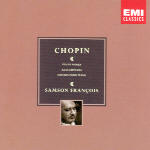The engaging, volatile, and unpredictable artistry of Samson François comes up for re-evaluation in a budget-priced EMI boxed set encompassing his complete recorded Chopin repertoire. It’s identical in content and sound to EMI CZS4 73386-2, but it’s packaged in a space-saving container. Like his mentor Alfred Cortot, François often seemed indifferent to the microphone’s unforgiving aura, playing for the moment rather than for all time. This attitude worked best for François when in full physical and mental command of his great gifts. In general, the earliest recordings are the best, both from an artistic and sonic standpoint. Compare the naturally balanced mono engineering in the Mazurkas to EMI’s closer, relatively airless stereo pickup in the Nocturnes and Third Sonata and you’ll hear for yourself. The assertive sweep, overflowing temperament, and sense of risk François brings to each of the four Ballades easily absorbs sundry smudges and old-school breaking of hands. By contrast, similar devices sound mannered and eccentric in portions of the Scherzos: the overloaded left-hand voicings at the outset of No. 1, or No. 4’s tempo distensions. At least François takes unusual care articulating No. 2’s opening triplet flourish rather than blurring it.
In François’ hands, both books of Études proceed in a clear, straightforward, and rather ordinary fashion, although inspiration runs higher in the Op. 25 group. The pianist admirably captures the diverse moods and radical harmonic ideas throughout the Mazurkas in performances that match the fanciful control and athleticism of Arthur Rubinstein’s 1950s-vintage cycle. Some might find the more outgoing Waltzes overly italicized and self-conscious in detail (the exaggerated pause between the Op. 34 No. 1 A-flat Waltz’s opening statements, contrived voicings, mincing accents, and the like). François takes a dry, hard-toned route through the Nocturnes’ darkly rippling waters, but the journey is never static. While nowhere near as colorful or refined as Ivan Moravec’s matchless contemporaneous version, François’ edgy leanness proves a refreshing foil.
François’ arrestingly detailed B-flat minor sonata only disappoints in its flinty, prosaic finale. Following the Funeral March’s Trio, François, like Cortot, takes the left-hand part in the main theme down an octave. I can’t muster much joy for the pianist’s rhythmically labored and overly cautious B minor Sonata. Likewise, the canonical Polonaises, the Tarantella, and portions of the Barcarolle are riddled with slack rhythms and lackadaisical phrasing that possibly reflects the pianist’s physical decline in the years before his early death in 1970. But the three posthumous Polonaises plus the Andante Spianato and Grande Polonaise, late recordings all, are winningly characterized and technically shipshape. Of Chopin’s two piano concertos, I suspect François harbored greater affinity for the F minor. This set includes the pianist’s stereo versions, which are better engineered yet less pianistically tidy next to François’ superior mono editions under Georges Tzipine’s baton, available in EMI’s anthology Les Introuvables de Samson François. Pierre Baribizet joins François for a sensitive if not especially effervescent Rondo for Two Pianos.
Lastly, the Op. 28 Preludes find François on inspired and often great form. The étude-like G major, F-sharp minor, B-flat minor, E-flat major, and D minor selections particularly gain from the pianist’s purposeful left-hand inflections. Listeners sympathetic to Martha Argerich’s kinetic energy surely will relate to François’ rhetorical eruptions in the F minor and G minor Preludes. As with Cortot’s Chopin, François’ interpretations may be uneven, but they never lack interest. His finest moments easily justify this boxed set’s purchase.
































